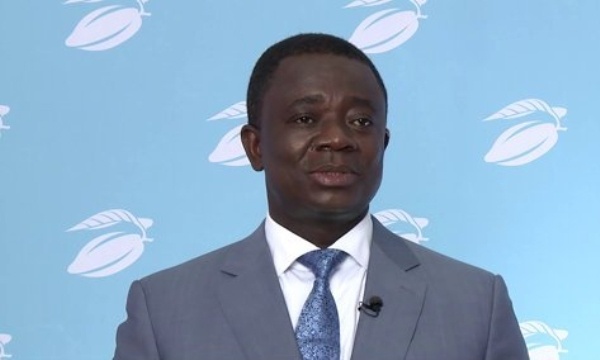
A key witness of the state in the trial of beleaguered former Chief Executive Officer of COCOBOD, Dr Stephen Opuni has confessed to his involvement in the purchase of over US$268 million fertilizer for the 2011/12 cocoa season through soul-sourcing.
The witness, Dr Yaw Adu-Ampomah’s confession comes on the back of the prosecutors claim that the practice of soul-sourcing was alien to the Ghana Cocoa Board until the emergence of Dr Stephen Kwabena Opuni as CEO of the board.
Below are excerpts of the proceedings from court:
Q: Having occupied positions at COCOBOD, you are aware of the factors that affect cocoa yield.
Ans: Yes my lord.
Q: Give us some of the factors.
Ans: If chemicals are not applied at the appropriate time; if the rainfall is slow; if the drought is severe; If disease incidents are high and not control at the appropriate time; if pest-incidents are also high and not controlled well; and poor agronomic practices are all factors that can affect yield.
Q: You have mentioned more than 5 factors that affect cocoa yield and as an expert, you will agree with me that not a single fact can be associated to crop yield.
Ans: Yes my lord. All of them work together and so if one is ignored, it can affect yield.
Q: So you will agree with me that the fact that you have purchased enough fertilizer and applied them without the contribution of the other factors will affect yield.
Ans: My lord, if the fertilizer is compromised, it will affect yield.
Q: If you have good fertilizer but uneven rain distribution, it can affect yield?
And: Yes, my lord.
Q: In fact, if the fertilizer is good with good rainfall but if there are pest-incidents, it can also affect yield.
Ans: Yes my Lord. There are several other factors
Q: Dr, being an expert, you may know the total production of cocoa in Ghana at least from since you worked at COCOBOD as deputy CEO, A and QC.
Ans: Yes, my Lord
Q: You will agree with me that though cocobod purchased a lot of fertilizer in 2011/2012 season there was a shortage of over 140 thousand metric tonnes.
Ans: Yes, my Lord. As I said if cocoa gets a high yield in a particular year and if care is not taken it will reduce the following year. We foresaw it and that is why we increased fertilizer procurement.
Q: The question is, in spite of purchasing more fertilizer in 2011, there was a shortage the next season from 1million metric tonnes to 800 plus metric tonnes.
Ans: Yes, but that is why I said if the cocoa trees are not given enough fertilizer, production can fall
Q: Dr, in 2012 /2013 seasons, in spite of fertilizers purchased, the total production again fell
Ans: Yes, as I said if a cocoa tree gives you such unprecedented yield in 2010 it can reduce
Q: Dr, you can’t attribute the fall to only one factor.
Ans: Yes, my lord but it was the major factor
Q: You know that in the first year of Dr Stephen Opuni, cocoa production went up to 896,221 tones in spite of the fact that less [sic] fertilizers were purchased as compared to 2011/12 season.
Ans: My lord know, the credit will go for the previous crop season.
Q: So Dr, with that analogy, if you are right, then the 2016/17 yield of 969, 511 metric tonnes should be attributed to the application of 2015/16 cocoa season [which included the use of contentious Lithovit Liquid Fertilizer].
Ans: Yes my Lord
Q: You also know the weather is still a factor.
Ans: Yes my lord
Q: Dr Adu Ampomah, being conversant with rain you will be aware of the world wide el nino.
Ans: Yes my Lord
Q: It is an extreme and unusual weather pattern.
Ans: Yes my Lord
Q: In fact, you are aware that it is sub-characteristics of prolonged try weather.
Ans: Yes my Lord
Q: In 2014, the el nino weather was experienced in Ghana and affected agriculture in general.
Ans: My lord, I wouldn’t know.
Q: In fact, this el nino weather adversely affected cocoa production in Ghana.
Ans: My lord, that is debatable.
Q: You informed this court that after you retired from Cocobod in 2013, you were still involved with the cocoa industry.
Ans: Yes my Lord
Q: In fact, there was general information in the cocoa industry and Ghana cocoa industry that this phenomenon affected cocoa yield.
Ans: Yes, it can affect
Q: If indeed you were with cocoa Abrabo pa which deals with the livelihood of cocoa farmers, you would know this.
Ans: My lord this is a weather situation that affects the west coast of Africa and the eastern coast of Latin America. It can affect yield sometimes.
Judge: Let’s end here for today.
Sam Kudjoe: My Lord, I had wanted to get here on a good note but you made it seem I was delaying.
Sitting was adjourned to June 12, 2019 for cross-examination to continue
